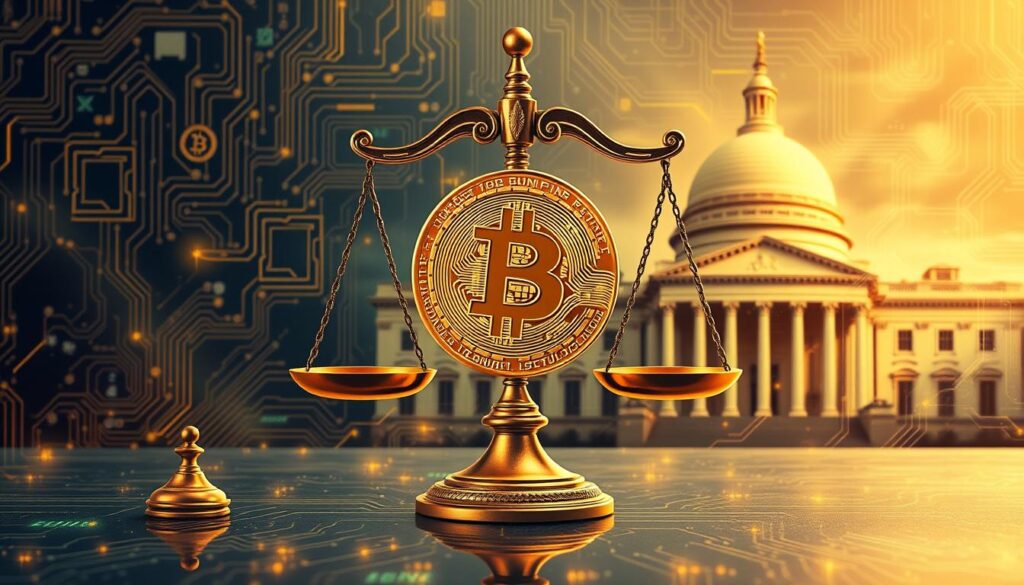In the dynamic landscape of finance, a digital revolution has taken hold, and at the forefront of this transformation stands Bitcoin (BTC), the pioneering cryptocurrency that has captivated the world. This comprehensive guide delves into the intricacies of Bitcoin, exploring its fundamental concepts, the revolutionary blockchain technology that underpins it, and its disruptive impact on traditional financial systems.
Bitcoin, often referred to as the “digital gold,” has emerged as a groundbreaking form of digital currency, offering a decentralized and secure alternative to conventional fiat money. Through the power of blockchain, Bitcoin operates without the intervention of governments or financial institutions, challenging the established norms of the financial industry and paving the way for a more inclusive and transparent financial ecosystem.
Key Takeaways
- Bitcoin is a decentralized digital currency that operates on blockchain technology, independent of governments or financial institutions.
- The blockchain technology behind Bitcoin enables secure, transparent, and tamper-proof transactions, revolutionizing the financial landscape.
- Bitcoin has the potential to disrupt traditional finance, offering faster, cheaper, and more accessible financial services to a global audience.
- Acquiring and storing Bitcoin requires establishing a digital wallet and understanding the process of buying and selling on cryptocurrency exchanges.
- Investing in Bitcoin carries both potential benefits and risks, including volatility and security concerns, which investors must carefully consider.
Understanding Bitcoin: The Revolutionary Decentralized Currency
At the heart of the cryptocurrency revolution lies Bitcoin, the world’s first and most well-known decentralized currency. Launched in 2009, Bitcoin has transformed the way we think about money, breaking free from traditional financial systems and empowering individuals to take control of their own financial transactions.
What is Bitcoin?
Bitcoin is a digital asset and a payment system that operates without the involvement of a central authority or government. It is a peer-to-peer system where transactions take place between users directly, without an intermediary. This decentralized nature is the key to Bitcoin’s success, as it eliminates the need for banks, financial institutions, or any third-party to facilitate or validate transactions.
The Blockchain Technology Behind Bitcoin
The foundation of Bitcoin is the blockchain technology, a distributed digital ledger that records all Bitcoin transactions in a secure, transparent, and tamper-resistant manner. The blockchain is maintained by a network of computers, known as nodes, that verify and validate each transaction, ensuring the integrity of the system. This decentralized consensus mechanism is what makes the blockchain technology and, by extension, Bitcoin, so revolutionary and resilient.
By understanding the core principles of Bitcoin and the underlying blockchain technology, individuals can gain a deeper appreciation for the transformative potential of cryptocurrency and its impact on the traditional financial landscape.
Bitcoin (BTC) and Its Disruptive Impact on Traditional Finance
The advent of Bitcoin, the pioneering cryptocurrency, has profoundly impacted the traditional financial landscape. As a decentralized digital currency, Bitcoin challenges the dominance of centralized banking and financial institutions, paving the way for a more democratized and accessible financial system.
At the core of Bitcoin’s disruptive influence is its peer-to-peer transaction model, which eliminates the need for intermediaries like banks. This decentralized approach allows for direct, secure, and transparent value exchange, reducing transaction costs and processing times. Furthermore, Bitcoin’s underlying blockchain technology enables the development of decentralized applications (dApps) that can further revolutionize traditional finance.
| Traditional Finance | Bitcoin-Powered Decentralized Finance |
|---|---|
| Centralized control and decision-making | Decentralized, transparent, and autonomous operations |
| Reliance on intermediaries like banks and financial institutions | Direct, peer-to-peer transactions without intermediaries |
| Restricted access and higher transaction costs | Increased accessibility and reduced transaction fees |
| Delayed settlement and limited operational hours | Near-instantaneous settlements and 24/7 availability |
The disruptive impact of Bitcoin is not limited to individual transactions; it also extends to the realm of decentralized finance (DeFi). DeFi, powered by blockchain technology, offers a wide range of financial services, from lending and borrowing to trading and asset management, without the need for traditional financial institutions.
As the cryptocurrency market continues to evolve, the influence of Bitcoin on traditional finance is likely to grow, leading to a more accessible, transparent, and innovative financial landscape that empowers individuals and democratizes access to financial services.
How to Acquire and Store Bitcoin
Navigating the world of digital assets can seem daunting, but acquiring and securely storing Bitcoin is a straightforward process. Whether you’re a seasoned investor or a newcomer to the cryptocurrency market, understanding the steps involved is crucial.
Setting Up a Bitcoin Wallet
A Bitcoin wallet is a digital platform that allows you to store, send, and receive your Bitcoin. There are various types of wallets, each with its own advantages and considerations. Hardware wallets, for instance, offer the highest level of security by storing your private keys offline, while software wallets provide more convenience for day-to-day transactions.
Buying Bitcoin on Cryptocurrency Exchanges
Once you have set up your Bitcoin wallet, the next step is to acquire Bitcoin. Cryptocurrency exchanges are the most popular platforms for purchasing digital assets, including Bitcoin. These exchanges facilitate the exchange of fiat currency (such as USD or EUR) for Bitcoin, making it easy for investors to get started. Before making a purchase, be sure to research the reputation and security measures of the exchange you choose.
- Select a reputable cryptocurrency exchange
- Create an account and complete the necessary verification process
- Link your bank account or payment method to facilitate the purchase
- Place your order and wait for the transaction to be processed
- Transfer your Bitcoin to your personal wallet for secure storage
By following these steps, you can effectively acquire and store your Bitcoin, paving the way for your venture into the dynamic world of cryptocurrency.
The Advantages and Risks of Investing in Bitcoin
As the world of finance evolves, Bitcoin has emerged as a significant player in the digital currency landscape. While Bitcoin investment can offer potential benefits, it is crucial to understand the volatility and security concerns associated with this asset.
Potential Benefits of Bitcoin Investment
One of the primary advantages of investing in Bitcoin is the possibility of capital appreciation. Over the years, Bitcoin has demonstrated remarkable price appreciation, providing early investors with substantial returns. Additionally, Bitcoin can serve as a diversification tool in investment portfolios, as its price movements often differ from traditional asset classes.
Furthermore, Bitcoin’s accessibility to unbanked populations is a compelling aspect of its investment potential. By offering a decentralized and borderless financial system, Bitcoin can empower individuals who lack access to traditional banking services, enabling them to participate in the global economy.
Volatility and Security Concerns
Despite its potential benefits, Bitcoin investment is not without risks. The cryptocurrency market is known for its high volatility, with Bitcoin’s price often experiencing significant fluctuations in short periods. This volatility can pose challenges for investors, making it difficult to predict the asset’s performance and manage risk effectively.
Another critical concern is the security of Bitcoin investments. Cryptocurrency exchanges and digital wallets can be vulnerable to hacking, theft, or loss, potentially exposing investors to significant financial losses. Securing and storing Bitcoin requires diligent attention to best practices, which may not be familiar to all investors.
“Investing in Bitcoin is like riding a rollercoaster – the thrill can be exhilarating, but the risks can be daunting. It’s crucial to understand both the potential rewards and the volatility before diving in.”
Bitcoin Mining: The Process and Its Significance
The world of Bitcoin is fueled by an intricate process known as Bitcoin mining. This process is essential for validating transactions and maintaining the integrity of the Bitcoin blockchain, the decentralized ledger that underpins the cryptocurrency. Miners, the backbone of the Bitcoin network, employ powerful computer hardware and software to solve complex cryptographic algorithms, with the first to find the solution receiving Bitcoins as a reward.
The mining process serves a dual purpose: it not only introduces new Bitcoins into circulation but also verifies the authenticity of each transaction, ensuring the security and reliability of the network. As the supply of new Bitcoins decreases over time, the mining rewards are halved every four years, a design feature intended to control the overall supply and maintain the currency’s value.
Miners contribute to the network by confirming transactions, and the process can be undertaken with basic equipment, such as personal computers. However, the most successful miners often participate in mining pools or utilize specialized hardware, like GPUs or ASICs, to boost their computational power and increase their chances of earning rewards.
“Bitcoin mining is the process of adding transaction records to Bitcoin’s public ledger of past transactions or blockchain.”
The significance of Bitcoin mining cannot be overstated. It serves as the backbone of the cryptocurrency, ensuring the continuous verification of transactions and the introduction of new Bitcoins into circulation. As Blockchain technology continues to evolve and Cryptocurrencies gain mainstream adoption, the role of miners will only become more crucial in maintaining the integrity and trust of the decentralized financial ecosystem.

Bitcoin’s Role in Decentralized Finance (DeFi) and Smart Contracts
As the world of finance evolves, Decentralized Finance (DeFi) has emerged as a transformative concept that leverages the power of Cryptocurrency and Smart Contracts to create a more inclusive and transparent financial ecosystem. Bitcoin, the pioneering Cryptocurrency, has played a crucial role in paving the way for this financial revolution.
DeFi and the Future of Finance
DeFi harnesses the underlying blockchain technology of Cryptocurrency to develop decentralized applications and services that operate outside the traditional banking system. This innovative approach allows for the creation of Smart Contracts – self-executing agreements that automatically enforce the terms of a contract without the need for a central authority.
- DeFi enables peer-to-peer lending, borrowing, and trading, empowering individuals to take control of their financial decisions.
- The use of Smart Contracts ensures transparency, security, and efficiency in financial transactions, reducing the need for intermediaries.
- By leveraging the decentralized nature of Cryptocurrency, DeFi has the potential to increase financial inclusion and access to services, particularly for underserved communities.
The integration of Bitcoin and other Cryptocurrencies into the DeFi ecosystem has demonstrated the vast potential of this technology to transform the future of finance. As DeFi continues to evolve, it is poised to reshape the way we manage our finances, making them more transparent, accessible, and empowering for individuals and businesses alike.
“DeFi has the potential to democratize finance, making it more accessible and inclusive for everyone.”
Regulatory Landscape and Legal Considerations for Bitcoin
In the rapidly evolving world of cryptocurrencies, the regulatory landscape surrounding Bitcoin has become increasingly complex. Governments and financial authorities across the globe are grappling with the legal status and implications of this digital currency, leading to a patchwork of regulations and guidelines that can be challenging to navigate.
One of the primary areas of concern is the taxation of Bitcoin transactions. Bitcoin Regulation varies significantly between countries, with some jurisdictions treating Bitcoin as a form of property, while others classify it as a currency. This distinction can have significant implications for individuals and businesses engaging in Bitcoin-related activities, particularly when it comes to capital gains taxes and reporting requirements.
Another key regulatory consideration is the issue of anti-money laundering (AML) and cryptocurrency regulations. Governments are concerned about the potential for Bitcoin to be used for illicit activities, and have implemented various measures to monitor and control the flow of digital currencies. This has led to the development of know-your-customer (KYC) and other compliance requirements for Bitcoin exchanges and wallet providers.
- Varying legal status of Bitcoin across different countries
- Taxation implications for Bitcoin transactions
- Anti-money laundering (AML) and compliance measures for cryptocurrency exchanges
- Ongoing debates about the regulatory framework for Bitcoin and other digital assets
As the Bitcoin ecosystem continues to evolve, regulators and policymakers are faced with the challenge of striking a balance between fostering innovation and mitigating potential risks. The regulatory landscape for Bitcoin remains a dynamic and rapidly changing field, with significant implications for individuals, businesses, and the broader financial system.

“The regulatory framework for Bitcoin and other cryptocurrencies will continue to be a critical factor in shaping the future of these digital assets.”
Bitcoin’s Environmental Impact and Sustainability Debates
As the popularity of Bitcoin (BTC) and other cryptocurrencies continues to grow, concerns have been raised about their environmental impact. The energy-intensive nature of the Bitcoin mining process has led to discussions about the cryptocurrency’s sustainability and carbon footprint.
One of the primary issues surrounding Bitcoin’s environmental impact is the significant amount of energy required to power the network. Bitcoin mining, the process of verifying and adding transactions to the blockchain, involves complex computational tasks that consume large amounts of electricity. This has led to concerns about the carbon emissions associated with Bitcoin mining, as much of the energy used is still generated from non-renewable sources.
- According to a recent study, the annual electricity consumption of the Bitcoin network is estimated to be around 130 terawatt-hours, which is comparable to the energy usage of a country like Argentina.
- The environmental impact of Bitcoin mining is further exacerbated by the fact that it is often concentrated in regions with cheap and abundant electricity, such as China, where a significant portion of the energy is generated from fossil fuels.
In response to these concerns, there have been various initiatives and proposals aimed at improving the sustainability of Bitcoin and the broader cryptocurrency ecosystem. These include:
- Transitioning to more energy-efficient mining hardware and techniques, such as the use of renewable energy sources like solar and hydropower.
- Exploring alternative consensus mechanisms, like Proof-of-Stake, which are less energy-intensive than the traditional Proof-of-Work model used by Bitcoin.
- Encouraging the development of cryptocurrency projects that prioritize environmental sustainability and low-carbon solutions.
As the Bitcoin and cryptocurrency industry continues to evolve, the debate over its environmental impact and sustainability is likely to remain a topic of significant interest and discussion.
“The environmental impact of Bitcoin is a complex issue that requires a nuanced and comprehensive approach. Balancing the benefits of cryptocurrency innovation with its environmental costs is crucial for ensuring a sustainable future.”
Conclusion
As we reach the culmination of our exploration into the world of Bitcoin, it’s evident that this revolutionary digital currency has emerged as a transformative force in the financial landscape. The decentralized nature of the Bitcoin network, underpinned by the groundbreaking blockchain technology, has the potential to redefine the way we think about currency, transactions, and the very foundations of global finance.
Throughout this article, we’ve delved into the intricacies of Bitcoin, from its fundamental principles to its disruptive impact on traditional banking systems. We’ve examined the process of acquiring and storing Bitcoin, as well as the potential benefits and risks associated with investing in this digital asset. Moreover, we’ve explored the significance of Bitcoin mining and its role in the decentralized finance (DeFi) ecosystem, as well as the ongoing discussions surrounding the cryptocurrency’s environmental impact and regulatory considerations.
As the Bitcoin and broader cryptocurrency industry continues to evolve, it’s clear that the future holds vast opportunities and challenges. Responsible development, innovative solutions, and a collaborative approach among stakeholders will be crucial in navigating this dynamic landscape. By remaining informed, adaptable, and mindful of both the transformative potential and the inherent risks, individuals and institutions can leverage the power of Bitcoin and other digital assets to shape the financial landscape of tomorrow.
FAQ
What is Cardano (ADA)?
Cardano is a decentralized public blockchain platform and cryptocurrency project. It is designed as a more secure and sustainable alternative to existing blockchain technologies, with a focus on scalability, interoperability, and energy efficiency.
What makes Cardano unique?
Cardano’s unique features include its use of the Ouroboros protocol, a provably secure and energy-efficient Proof-of-Stake consensus mechanism, and its emphasis on functional programming and peer-reviewed research in its development process.
How does Cardano’s Proof-of-Stake work?
Cardano’s Proof-of-Stake protocol, Ouroboros, aims to be more energy-efficient and secure than traditional Proof-of-Work protocols used by cryptocurrencies like Bitcoin. In Ouroboros, users who hold ADA tokens can participate in the blockchain validation process and earn rewards for their contributions, without the need for energy-intensive mining.
What are the key features and capabilities of Cardano?
Cardano is designed to enable the development of decentralized applications (dApps) and smart contracts, allowing for the creation of a wide range of decentralized solutions. It also emphasizes interoperability, allowing Cardano to seamlessly communicate and exchange data with other blockchain networks.
Who is behind the development of Cardano?
Cardano was co-founded by Charles Hoskinson, a co-founder of Ethereum. The development of Cardano is led by Input Output Hong Kong (IOHK), a blockchain research and engineering company.
What are the potential use cases for Cardano?
Cardano’s features and capabilities lend themselves to a wide range of potential use cases, including decentralized finance (DeFi), supply chain management, identity management, voting systems, and Internet of Things (IoT) applications, among others.
How does Cardano’s development approach differ from other blockchain projects?
Cardano’s development is guided by a peer-reviewed, research-driven approach, where new features and changes are thoroughly evaluated and validated by a global community of academics and experts before being implemented. This emphasis on academic rigor and formal methods aims to ensure the long-term security and scalability of the Cardano blockchain.


No comments yet